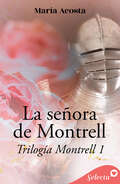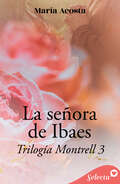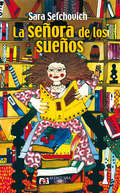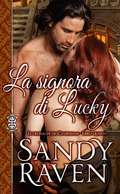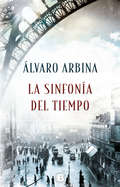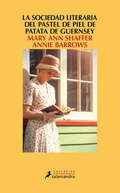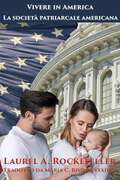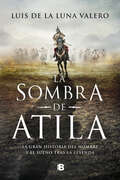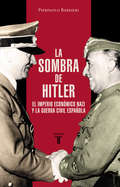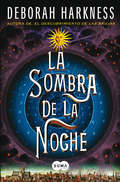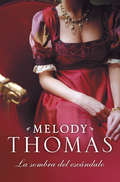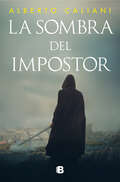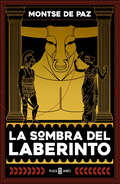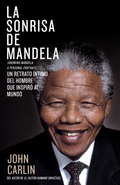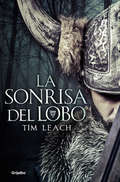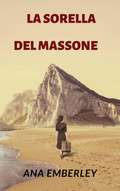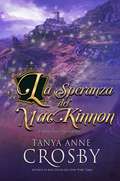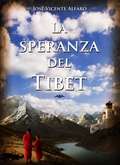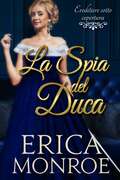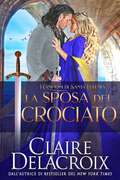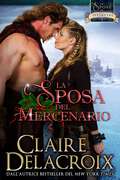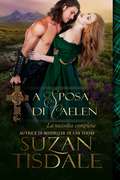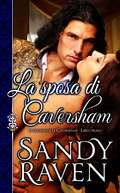- Table View
- List View
La señora Montrell (Montrell #Volumen 1)
by María AcostaEntre el deber y el amor, ¿qué camino escogerá? Diego está a un paso de conseguir lo que quería: es el señor de Montrell y su boda con Doña Elvira va a convertirlo en uno de los hombres más afortunados del Reino. ¿Pero cuán caprichoso puede ser a veces nuestro destino? Esperanza regresa a la aldea tras casi una década y lo hace con motivo de la boda de su señora. Está dispuesta a enterrar en su corazón el amor que siente por el que fuera su amigo de la infancia. Un amor que nunca ha sido correspondido... ¿o sí?
La señora de Ibaes (Montrell #Volumen 3)
by María AcostaUna mujer sola. Una relación clandestina. Un amor hecho para romper sus propias barreras. Doña Elvira López y Fresneda sigue siendo la señora de Montrell. A sus cuarenta años, ha pasado los últimos dieciocho cumpliendo con sus deberes al frente del señorío, pero todo eso está a punto de cambiar por culpa de una carta. Miguel de Brenes ya no es el mercenario que era. Ahora su vida se centra en su familia y en el cuidado de su granja de ovejas. Con la visita de Elvira a la aldea, vuelve a resurgir el pasado y la atracción que se despertase entre ellos desde el momento en que se conocieron. Los miedos, la pasión y el amor se conjugarán para cambiar las vidas de Elvira y Miguel para siempre.
La señora de los sueños
by Sara Sefchovich¿Cuántas veces es posible vivir en el lapso de la existencia? Una exploración sobre los deseos y anhelos de libertad de un ama de casa. Ana Fernández descubre que el único sentido de su vida ha sido ser madre y esposa, pero también descubre la dulce seducción de los libros. Así, conoce Arabia, estepas rusas, ciudades europeas, Las Galápagos, la India; y también a Pushkin, Darwin, y Gandhi.
La señorita Wright va a la guerra (El destino de los Wright #Volumen 2)
by Claudia CardozoDos corazones enzarzados en la más apasionada de las batallas.La señorita Charlotte Wright se dejó convencer de que el marqués de Wingrove no era el hombre adecuado para ella. Abrumada por los deseos de su enérgica abuela, decidió dejarlo marchar renunciando al amor que aquel hombre le inspiraba, y ha visto pasar su juventud sumida en la añoranza por lo que pudo ser.Hugh Hamilton ha vuelto a Inglaterra con la intención de ocupar el lugar que le corresponde y para ello necesita una esposa adecuada. Desde luego, la posibilidad de entablar nuevamente relaciones con la mujer que alguna vez lo rechazó no puede estar más lejos de sus intenciones. Todos saben que la señorita Wright se ha convertido en una joven poco sociable y ya empiezan a endilgarle el título de solterona.Lo que el despechado marqués no puede prever es que el destino se ocupará de frustrar sus planes porque su antiguo amor está dispuesto a hacer lo que sea necesario para recuperarlo; incluso declararle la guerra.El destino de los Wright nos traslada en primer lugar a la Inglaterra de la época de Regencia. Nos lleva de los grandes bailes de Londres a la campiña inglesa. También a las Tierras Altas de Escocia, sin que falte un paseo por España. Todo siguiendo las vidas de la familia Wright cuyo legado perdurará en el tiempo.
La signora di Lucky (Le cronache dei Caversham, libro #4)
by F. Rossi Sandy RavenLucky Gualtiero arriva a Baltimora per visitare il cantiere navale per cui quella città è rinomata, ed è sorpreso di scoprire che l'architetto che progetta quelle navi è una giovane donna, la cui intelligenza e indipendenza accende il suo interesse intellettuale, e non solo. Mary-Michael Watkins ha sposato l'anziano proprietario del cantiere per l'educazione che può garantirle, ma l'unica cosa che non ha potuto darle è un figlio. Quando lui si rende conto di stare per morire, convince Mary ad uscire dal matrimonio per poter procreare, e a farlo presto. Lei sceglie Lucky come padre del suo bambino, con l'intenzione di far crescere il figlio come erede di suo marito. Il piano di Mary-Michael però trova degli ostacoli... "La signora di Lucky" è il quarto libro della serie "Le cronache dei Caversham", dopo il prequel "Miss Amelia accalappia un duca", romanzo breve, e i romanzi "La sposa di Caversham", "Già sua" e "L'amore di Sarah". Ogni volume racconta la storia di uno dei membri della famiglia Caversham, e può essere letto da solo. Pur non essendo prettamente un romanzo erotico, contiene scene di sesso.
La sinfonía del tiempo
by Álvaro Arbina<P>La sinfonía del tiempo confirma a Álvaro Arbina, autor de La mujer del reloj, como uno de los grandes narradores de hoy. Una joven escritora que trata de desentrañar la misteriosa desaparición de su marido... <P>Una poderosa familia de la industria vasca que vive entre fantasmas y leyendas... Un científico dispuesto a descifrar la sinfonía oculta tras el curso de la Historia... <P>Este es el relato de todas las vidas que se cruzan con ellos, en un entramado de secretos que se extiende por Europa y cuyas raíces se hunden en las costas del Cantábrico, en sus ensenadas y caseríos ancestrales, en las minas y fundiciones que arden junto a las rías. <P><P>La sinfonía del tiempo es una emocionante historia de amor, una gran saga familiar y una poderosa intriga histórica. Un fascinante viaje a los tiempos del acero y el carbón, de los edificios de hierro y cristal, de los avances industriales y científicos, de la desigualdad social y el refinamiento burgués
La sirena de las aguas turquesas (Velo de norte #Volumen 1)
by Judit FernándezUn hombre sin memoria.Una heroína en busca de justicia.Amor, valor y fortuna: sus caminos se verán entrelazados, y su amor habrá de sobrevivir al destino y a los mismos dioses. Venecia, año 1009. Gabriella es una huérfana que, cansada de vivir las injusticias entre nobles y plebeyos adopta la identidad secreta de «La Sirena», ladrona y justiciera del pueblo. Sin embargo, su mundo da un vuelco cuando las aguas del río arrastran hasta ella a un bárbaro del norte medio muerto y sin memoria. Einar Jürgenson ha olvidado de dónde viene y cómo ha llegado hasta allí, pero en Gabriella encontrará un camino para recuperar su vida perdida. Decidido a ayudarla a vencer a los tiranos de Venecia, caen en un inesperado amor el uno con el otro, más cuando el pasado del hombre vuelve súbitamente a él, debe tomar una decisión. ¿Regresar a Escandinavia con los suyos, o vivir una nueva vida junto a ella? ¿Podrá su amor sobrevivir a sus diferencias?
La sociedad literaria y del pastel de piel de patata Guernsey
by Annie Barrows Mary Ann ShafferTraducida a más de 20 idiomas, con más de 5 millones de ejemplares vendidos en todo el mundo y llevada al cine por Mike Newell, La Sociedad Literaria del Pastel de Piel de Patata de Guernsey es una deliciosa y conmovedora novela epistolar que se ha convertido en un clásico indiscutible sobre el poder de la palabra y el valor de la literatura como refugio y consuelo en tiempos difíciles. En un Londres devastado por las bombas y que empieza a recuperarse de las terribles heridas de la Segunda Guerra Mundial, Juliet Ashton, una joven escritora en busca de inspiración novelesca, recibe la carta de un desconocido llamado Dawsey Adams. El hombre, que vive en la isla de Guernsey, un pequeño enclave en el canal de la Mancha, está leyendo un libro de Charles Lamb que había pertenecido con anterioridad a Juliet. ¿Cómo ha llegado ese ejemplar hasta Guernsey? ¿Por qué Dawsey decide ponerse en contacto con Juliet? Dawsey es miembro del club de lectura La Sociedad Literaria del Pastel de Piel de Patata de Guernsey, creado en circunstancias difíciles durante la contienda, una rareza en tiempos de ocupación alemana. Cuando Juliet acepta la invitación de estos excéntricos lectores para visitar Guernsey, entiende que ellos y su increíble sociedad literaria serán los personajes de su nueva novela, y su vida dará un vuelco para siempre. Una historia humana y divertida, que transmite una intensa pasión por los libros y reivindica la formidable capacidad de la lectura para unir a personas de distintos gustos, culturas e ideologías. Reseñas:«Una novela inteligente y deliciosa, un mundo tan vívido que siempre me olvido de que se trata de una obra de ficción y de que sus personajes maravillosos no son mis amigos ni mis vecinos.»Elizabeth Gilbert «Esta novela conmovedora y llena de observaciones de gran agudeza es una pequeña obra maestra acerca del amor, la guerra y el sustento inconmensurable que hallamos en los buenos libros y en los buenos amigos. Una joya.»People «La Sociedad Literaria del Pastel de Piel de Patata de Guernsey es no solo una novela epistolar adorable, tan encantadora y atemporal como las que sus personajes leen y aman, sino también un libro ideal para leer junto a la chimenea o en un largo viaje en tren.»San Francisco Chronicle Book Review «Las cartas que componen esta novela iluminan, con humor y candor, el sufrimiento de los habitantes de las islas del Canal durante la ocupación nazi. Cuando Juliet se traslada a Guernsey para trabajar en su libro, le resulta imposible abandonar dicha isla y a sus nuevos amigos, un sentimiento que tal vez experimenten los lectores cuando acaben esta novela deliciosa.»The Boston Globe «Un libro maravilloso. [...] Con ecos de 84, Charing Cross Road de Helene Hanff, esta novela es una celebración divertida, aguda y muy amena del poder de la palabra escrita.»Library Journal
La società patriarcale americana (Vivere in America #3)
by Laurel A. RockefellerL’esperienza americana dal punto di vista delle donne. La società patriarcale americana descrive cosa significa vivere in America per le donne. Sette tematiche relative al patriarcato in America vengono successivamente approfondite nella seconda parte del libro. •Le tematiche affrontate sono: •Il patriarcato nel mondo del lavoro •La padrona di casa come l’ideale della donna americana •La società patriarcale e l’istruzione •Il mansplaining •Violenza domestica e cultura dello stupro •Società patriarcale e denaro •Società patriarcale e aborto Un’indagine onesta della storia e cultura americana per come è stata e viene vissuta dalle donne che sicuramente farà riflettere parecchio e fornirà svariati ed interessanti spunti di discussione.
La sombra de Atila
by Luís De La Luna ValeroSU NOMBRE INSPIRABA TERROR. LAS CIUDADES SE RENDÍAN A SU PASO. EL TIEMPO LO CONVIRTIÓ EN LEYENDA Siglo V. Tras la muerte de su tío, Atila tiene solo veintinueve años y hereda, junto a su hermano, un imperio y un ejército que conoce mejor que ninguno el arte de la guerra. Hasta entonces las orillas del Danubio habían separado a los hunos de un Imperio Romano casi en ruinas y la paz había reinado entre ellos. Sin embargo, una ambición arde en el corazón de Atila: conseguir que los hunos se irguieran por encima de los demás pueblos, dominando el mundo entonces conocido y, así, convertirse en Historia. Esta fue la vida del gran estratega, cuyas posesiones se extendieron desde las llanuras húngaras hasta el norte de África, la alejada China e Hispania. En esta apasionante novela, impecablemente documentada, Luis Valero narra cómo el poder se convirtió en el motor de vida de un personaje eterno. Pero, por primera vez, como si pudiera trasladarse al campo de batalla en esos años sangrientos, el lector podrá ver más allá de la leyenda para entender al hombre detrás de ella.
La sombra de Hitler: El imperio económico nazi y la Guerra Civil española
by Pierpaolo BarbieriUna nueva y solvente teoría sobre la relación entre nazismo y franquismo. La Guerra Civil española a menudo se ha considerado como un ensayo general velado de la Segunda Guerra Mundial. El bando nacional se impuso gracias a la asistencia militar alemana e italiana, una colaboración hasta ahora entendida como natural entre regímenes afines que unen fuerzas en la lucha contra el bolchevismo. Frente a esa versión aceptada, Pierpaolo Barbieri defiende que fueron ambiciones económicas -y no razones ideológicas- las que impulsaron la intervención de Hitler. Barbieri demuestra que al apoyo material -aviones, armamento y tanques- subyacía un imperio informal que los nazis ejercieron mediante el control de recursos clave españoles, empleados para alimentar la floreciente industria bélica alemana. Este plan sólo fue posible gracias a Hjalmar Schacht, un «mago de las finanzas internacionales» cuyas políticas propiciaron el crecimientodel Tercer Reich, y alcanzaron su culmen en la relación económica sumamente ventajosa para Alemania que estableció el régimen nazi con el bando franquista. Sólo más adelante, ese imperio informal dio paso a un imperio racial en el que la rentabilidad económica quedó supeditada a criterios de carácter ideológico. Basado en una profunda investigación por distintos países de Europa, en seis idiomas y mediante documentos de archivos tanto republicanos como nacionales, La sombra de Hitler arroja nueva luz sobre una tragedia fratricida cuyos ecos aún resuenan en la sociedad española. La crítica ha dicho:«El imperio de la sombra de Hitler cuestiona la idea que teníamos de las intervenciones de Alemania e Italia en la Guerra Civil española. En este brillante debut, Pierpaolo Barbieri muestra que el imperialismo informal desempeña un papel más importante que la ideología fascista en el modo en que Berlín miró al conflicto. Barbieri también tiene buen oído para captar los ecos de la Guerra Civil que resuenan hoy en España -y de hecho también en Europa-.»Niall Ferguson «Un relato fascinante y estupendamente escrito del plan de dominación económica que Alemania lanzó en los años treinta. Barbieri nos lleva a replantearnos la relación entre economía y políticas raciales en la elaboración de la ofensiva nazi.»Harol James (Princeton) «Nada refleja los giros y cambios en la política económica y militar alemana antes de 1939 con tanta claridad como la participación alemana en la Guerra Civil española. Pierpaolo Barbieri ofrece un relato claro y convincente de cómo el «imperio informal» en España se convirtió en un trampolín para el imperialismo real en el resto de Europa.»Richard Overy
La sombra de la noche (El descubrimiento de las brujas #Volumen 2)
by Deborah HarknessLa esperada segunda parte de la trilogía «El descubrimiento de las brujas». Una vez asumida su condición de bruja con poderes para viajar en el tiempo, la historiadora Diana Bishop está preparada para emprender un viaje al pasado en el que poder encontrar el Ashmole 782 completo, el manuscrito secreto cuyos poderes deben comprender para evitar el fin de la pacífica convivencia entre brujas, vampiros, daimones y humanos. Su marido, el genetista Matthew Clairmont, la acompañará en esta búsqueda, pero viajar al pasado no es tan sencillo para un vampiro, y mucho menos a un pasado que ya vivió, donde su «yo» del pasado desempeñó un relevante papel en la lucha política de la época; un «yo» que odiaba a las brujas como Diana. Rodeados de intrigas y en una incesante carrera por encontrar Ashmole 782, Diana y Matthew se adentrarán en el Londres isabelino acompañados por los amigos del Matthew del pasado, los miembros de la Escuela de la Noche, entre los que se encuentran Christopher Marlowe, sir Walter Raleigh e incluso Shakespeare. Pero también deberán refugiarse en un castillo de la campiña francesa y pasar unos meses en la corte del emperador Rodolfo II en Praga para lograr su objetivo y proteger su secreto, mientras Diana aprende a controlar la magia con una poderosa bruja. Reseñas:«La sombra de la noche no son solamente las magníficamente detalladas descripciones que hace de la Inglaterra de 1591, trata sobre haber estado allí. Los lectores viajan allí de forma tan precisa y tan precaria como Diana y Mathew».USA Today «La frágil convivencia entre especies depende del éxito de la misión de Diana y Matthew, pero su matrimonio es precisamente la mayor amenaza para esa convivencia. Como en un espléndido tapiz, en La sombra de la noche los hilos de la alquimia, la magia, la ciencia y la poesía tejen una apasionada trama llena de amor eintriga».People «Harkness está atenta a todos los detalles académicos o emocionales con fantasía, sensualidad y humor».O, The Oprah Magazine
La sombra del escándalo (Familia Donally #Volumen 3)
by Melody Thomas¿Puede reinventarse un amor truncado? La tercera entrega de la saga de los Donally. Tendría que haber sido la velada más importante para Ryan Donally, el baile donde celebraría sus logros profesionales y anunciaría su brillante compromiso con una joven de la aristocracia. Pero la inesperada aparición de Rachel Bailey ha roto el espejismo. No solo le ha venido a la memoria el recuerdo de su amiga de la infancia, de un primer beso y de unas palabras cruzadas con amargura, sino también todo lo que ha tenido que dejar atrás para hacerse un hueco entre la elitista sociedad victoriana: su humilde origen irlandés, su familia, su religión y sus sentimientos. Durante los últimos años Rachel ha luchado en silencio para alcanzar sus propios sueños, mientras ocultaba a todos secretos y errores del pasado. Aunque nunca pudo olvidar a Ryan, únicamente ha viajado a Londres desde Irlanda para pedirle un favor. Por nada ni por nadie abandonaría la independencia y la libertad que tanto le han costado ganar. Hasta que un momento de pasión, y la sombra del escándalo, vuelve a unirles... esta vez en un matrimonio para el que ninguno de ellos está preparado...
La sombra del impostor
by Alberto CalianiBIENVENIDOS AL RENACIMIENTO. BIENVENIDOS AL CAOS. Alberto Caliani, el autor revelación de la novela histórica y galardonado con dos Premios Hislibris 2021, vuelve con una novela que hará temblar los cimientos del género. Turín, siglo XVI. Esta es una historia sobre hombres corruptos que persiguen un fin noble, y hombres nobles que cometen atrocidades. También es un relato de locura y superstición; de un inquisidor implacable y de una joven ingeniera adelantada a su tiempo; de un padre y un hijo que se odian y se necesitan; de un buscavidas sin escrúpulos que descubrirá que vale más de lo que él mismo cree; de una adolescente que huye de sí misma hasta encontrarse al borde de la muerte, y de un misterioso asesino invisible que acecha entre las sombras. Pero, sobre todo, es una epopeya de violencia e intrigas para acabar con el papa de Roma ycon las poderosas familias que mantienen dividida a una Italia debilitada por la guerra. Y todo ello, respaldado por una gran mentira que perdurará a través de los siglos.
La sombra del laberinto
by Montse de PazEn la línea de las novelas mitológicas de Madeline Miller,La sombra del laberinto narra la historia de Teseo, Ariadna y el Minotauro desde una nueva perspectiva atractiva y moderna. Androgeo, el joven príncipe de Creta, es asesinado durante los Juegos de Atenas, lo que provoca una crisis diplomática sin precedentes que amenaza con destruir el equilibrio de poder en el mar Egeo. Para impedirlo, Atenas acepta un tributo anual impuesto por los reyes de Creta: siete doncellas y siete mancebos serán condenados a entrar en el laberinto del temible Minotauro. Mientras tanto, la princesa Ariadna, a la que han educado para gobernar con mano de hierro, sueña con una vida más allá de los confines de la isla. Cuando el heroico Teseo, heredero al trono de Atenas, acude a Creta para poner fin al tributo de sangre, el éxito de su expedición dependerá de la enamoradiza Ariadna. ¿Aceptará ayudarle a vencer al Minotauro? ¿Se mantendrá fiel a su estirpe real o traicionará a su familia para huir en compañía del joven ateniense ? En la línea de las novelas mitológicas de Madeleine Miller,La sombra del laberinto reinventa la historia de Teseo, Ariadna y el Minotauro desde una nueva perspectiva atractiva y moderna. Montse de Paz da protagonismo a los personajes femeninos del mito y nos descubre su lado más humano y actual en una narración apasionante sobre el amor, la familia, la traición y el poder.
La sonrisa de Mandela
by John Carlin"Creo que, pese a la gran presencia de Mandela en la escena internacional, aún queda mucho por decir sobre el hombre, la calidad de su liderazgo y el legado que deja al mundo. Mi esperanza es que los lectores de este libro se lleven una idea más profunda de Mandela como persona y de porqué ha sido la figura moral y política más importante de nuestra época". --John Carlin Entre el 11 de febrero de 1990 y el 10 de mayo de 1994, Nelson Mandela pasó de ser el prisionero político más famoso del mundo a presidente de su país. Fueron cuatro años acelerados y fascinantes que dieron la talla humana y política de un líder excepcional. John Carlin, observador privilegiado de esa etapa, traza un emocionante retrato de Mandela en el que demuestra que se puede ser un gran líder político sin dejar de ser una gran persona, y que la reconciliación y la convivencia son no sólo deseables sino posibles incluso en las circunstancias más difíciles.
La sonrisa del lobo
by Tim LeachTengo una buena historia que contarte. De duelos y traiciones; de exilio y venganza.Ninguna otra historia importa, si esta se olvida. Una novela de vikingos con la épica y el poder de las historias contadas junto a una hoguera. En un mundo de hielo y nieve, el único código que reina es el del honor y la amistad. Todo empezó una noche de invierno, cuenta el poeta Kirián Sin Tierra. Él y su amigo Gunnar, un granjero con un poco de tierra y un pasado, salieron a acabar con el fantasma que, algunos decían, merodeaba en una granja vecina y acosaba a quienes se acercaban hasta ella. Sin embargo, era un engaño y mataron a un hombre. En la Islandia del siglo X hay delitos que solo pueden lavarse con plata o con sangre. La sonrisa del lobo nos transporta, con la fuerza evocadora y la épica de un relato contado junto a una hoguera, a una tierra dura de inviernos sin días y veranos sin noches. A una tierra de antiguos guerreros vikingos que vararon sus barcos pero todavía dispuestos a empuñar la espada, y de poetas que cambian historias por comida y canciones por un techo. A una tierra de hombres que huyeron de reyes y tiranos para ser libres e iguales, y que no temen apoyar a un amigo cuando lleva las de perder. Una tierra sin reglas salvo el honor y la ley, y donde no hay otro deber que el de la venganza.
La sorella del massone
by Ana EmberleyNella Spagna del dopoguerra, la giovane Maria Moreno si ritrova coinvolta in una missione che potrebbe aver cambiato il corso della storia circa la sovranità della Rocca di Gibilterra. Amore e odio, politica, spionaggio e massoneria si intrecciano in un groviglio di avventure ed esperienze dove la realtà si confonde con la finzione. Riuscirà LA SORELLA DEL MASSONE a raggiungere l'obiettivo a cui è stata trascinata?
La speranza del MacKinnon: Le spose delle Highlands
by Tanya Anne Crosby Elisa PardiniL'epilogo mancante di La sposa del MacKinnon Undici anni dopo, Hugh FitzSimon si ritrova un uomo distrutto. È stato abbandonato da tutti, è solo, un relitto che si crogiola nel proprio dolore. Come un Ebeneezer Scrooge di altri tempi, riceve la visita del fantasma della moglie defunta, venuta a mostrargli la sua vita che è trascorsa, quella che potrebbe essere, e quale sarà la sua fine se la sua fiamma consumerà la candela prima che FitzSimon riesca a fare ammenda. Nel frattempo, nelle Highlands, il clan del MacKinnon deve affrontare il più terribile dei momenti: il loro villaggio è stato distrutto da un incendio, e con l'inverno in arrivo come potranno accorrere al richiamo della guerra che già sussurra nell'aria? Un "fantasma" molto inaspettato potrebbe giungere in loro aiuto. Per anni i fan hanno richiesto un epilogo per La sposa del MacKinnon, ed eccola qua, un breve racconto che porterà un po' di gioia per le festività.
La speranza del Tibet
by Jose Vicente Alfaro Valentina PandolfiTibet, XIII secolo. Il cosidetto "Paese delle Nevi", faro del buddismo in oriente, è sotto l'autorità dell'impero mongolo, i cui domini si estendono per la maggior parte dei territori allora conosciuti. In questo contesto, la morte del leader della principale scuola buddista del paese obbliga i suoi seguaci a iniziare la ricerca della sua reincarnazione: un bambino totalmente ignaro della saggezza che possiede e del ruolo che il destino gli ha serbato per il futuro del paese. Nel frattempo, un'umile famiglia di origini contadine, minacciata dalle aggressioni dell'esercito mongolo, abbandona il paese natio e si ritrova a intraprendere un viaggio dalle conseguenze imprevedibili. Un romanzo vibrante e emotivo che immerge il lettore in un alone di leggenda in cui il fervore della gente e la crudezza del paesaggio si fondono in una sola anima.
La spia del duca (Ereditiere sotto copertura #1)
by Erica MonroeLEI VUOLE VENDETTA Quando Vivian Loren viene assunta come governante presso la ricca famiglia Spencer, il suo scopo è trovare indizi sull'omicidio del fratello, non vivere una storia d'amore. Ma non ha fatto i conti con James Spencer, l'intrepido duca di Abermont, dal passato tormentato quanto il suo. LUI HA BISOGNO DI UNA MOGLIE In qualità di capo della più importante agenzia di spionaggio inglese, James non può permettersi di attirare su di sè l'attenzione del mercato matrimoniale, inevitabile conseguenza dell'apertura della Stagione. Dopo aver scoperto che il desiderio di vendetta di Vivian l'ha resa una pedina dell'infido complotto di una delle più letali spie di Napoleone, James si rende conto che possono aiutarsi a vicenda. Lei risolverà il problema della scelta di una moglie, diventando la sua duchessa; lui la proteggerà. Ma, mentre la trappola della spia nemica si chiude intorno a loro, quello che è iniziato come un matrimonio di convenienza si trasforma ben presto in tutt'altro. Quando marito e moglie nascondono entrambi segreti oscuri, l'amore può diventare la più pericolosa di tutte le missioni.
La sposa del crociato (I Campioni di Santa Eufemia #1)
by Claire DelacroixGaston combatteva per dovere e con onore — prima che Ysmaine lo inducesse a combattere per il suo amore… Quando Gaston, cavaliere templare, eredita all’improvviso le terre di famiglia, sa di avere bisogno di una moglie e di un erede. Un matrimonio di convenienza con una vedova in condizione di necessità è una soluzione pratica e i novelli sposi lasciano Gerusalemme, con l’incarico di consegnare una cassa ai Templari. Lontano dalla vita che ha condotto per anni, ben presto Gaston si rende conto che il suo piano non procede come vuole — soprattutto per quanto riguarda la sua misteriosa moglie, la cui presenza riaccende una fiamma inaspettata… Due volte vedova, Ysmaine pensa che non si sposerà mai più, ancor meno di contrarre un matrimonio prestigioso — finché non resterà affascinata dalla volontà del rude cavaliere di difenderla. Ysmaine si sposa di nuovo, non solo per sua scelta, ma con un guerriero di cui ammira l’onore. È decisa a dimostrare a Gaston che il matrimonio può offrire a entrambi più di un erede, ma prima deve conquistare la fiducia dell’uomo diffidente che ha sposato d’impulso… Non immagina nemmeno che a Gaston sia stato affidato il tesoro dei Templari — ancor meno che qualcuno nel loro gruppo intende rivendicare il bottino a tutti i costi. In compagnia di estranei con molti segreti, Gaston potrà osare fidarsi della sua nuova sposa? Ysmaine riuscirà a convincere Gaston a confidare ciò che sa? Insieme, potranno fare luce sul mistero prima che si realizzi il piano del nemico e tutto sia perduto?
La sposa del mercenario (Le spose di Inverfyre #1)
by Claire DelacroixDerubato dei suoi averi, ferito e creduto morto, Quentin de Montgomerie ha perso tutto tranne il suo amore per Mhairi, la figlia del Falco di Inverfyre, e sa chi incolpare per il destino che gli è toccato. Giura di tornare a Inverfyre per vendicarsi del Falco, ma, al suo arrivo, scopre che la feroce fanciulla che possiede il suo cuore è diventata una vera bellezza e che il suo bacio ha il potere di restituirgli la fiducia nel futuro. Riuscirà Quentin a dimostrare il suo valore al Falco e a conquistare Mhairi, o lei lo disprezzerà perché lui non è più quello di una volta?
La sposa di Caelen
by Ernesto Pavan Suzan TisdaleLa raccolta completa dei romanzi che compongono la serie "La sposa di Caelen" Parte prima: Il sussurro della Provvidenza... in cui le voci corrono incontrollate. Pare seconda: Il bisbiglio del Fato... tornerà mai la pace? Parte terza: La voce della Speranza... che risuona nell'ora più buia.
La sposa di Caversham (Le cronache dei Caversham, libro #1)
by F. Rossi Sandy RavenCosa fareste per salvare coloro che amate di più? Venduta come schiava dagli uomini che avrebbero dovuto ucciderla, Angelia Gualtiero ora deve convincere l'uomo che l'ha acquistata ad aiutarla. Lia farebbe qualsiasi cosa per salvare il suo fratellino dalla zia assassina, anche sposare un uomo che sa che vuole solo usare il suo corpo. Marcus Renfield Halden, nono duca di Caversham, ha bisogno di un erede per mettere al sicuro la sua ricchezza, il suo titolo e il futuro delle sue giovani sorelle da un cugino disperato che sospetta l'abbia preso di mira alla ricerca del titolo di duca e della sua fortuna. Quando vede una donna che scappa da una guardia in un mercato di Tangeri, all'inizio resta affascinato dalla sua bellezza. Dopo che Ren viene a sapere la sua storia, è rapito dal suo coraggio. Allora, fa a Lia un'offerta che lei non può rifiutare. Suo fratello per un erede. Quello che nessuno dei due si aspetta è di innamorarsi. "La sposa di Caversham" è ambientato nel 1819, in luoghi come Genova, Tangeri, Londra e la nave dell'eroe mercante. Le date di pubblicazione degli altri volumi: Libro secondo: "Già sua", disponibile dal settembre 2015 Libro terzo: "L'amore di Sarah", disponibile dal dicembre 2015 Libro quarto: "La signora di Lucky", disponibile dal febbraio 2016 Inoltre, è già disponibile "Miss Amelia accalappia un duca", il prequel della serie.
